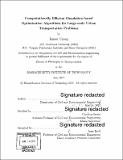Computationally efficient simulation-based optimization algorithms for large-scale urban transportation problems
Author(s)
Chong, Linsen
DownloadFull printable version (10.14Mb)
Other Contributors
Massachusetts Institute of Technology. Department of Civil and Environmental Engineering.
Advisor
Carolina Osorio.
Terms of use
Metadata
Show full item recordAbstract
In this thesis, we propose novel computationally efficient optimization algorithms that derive effective traffic management strategies to reduce congestion and improve the efficiency of urban transportation systems. The proposed algorithms enable the use of high-resolution yet computationally inefficient urban traffic simulators to address large-scale urban transportation optimization problems in a computationally efficient manner. The first and the second part of this thesis focus on large-scale offline transportation optimization problems with stochastic simulation-based objective functions, analytical differentiable constraints and high-dimensional decision variables. We propose two optimization algorithms to solve these problems. In the first part, we propose a simulation-based metamodel algorithm that combines the use of an analytical stationary traffic network model and a dynamic microscopic traffic simulator. In the second part, we propose a metamodel algorithm that combines the use of an analytical transient traffic network model and the microscopic simulator. In the first part, we use the first metamodel algorithm to solve a large-scale fixed-time traffic signal control problem of the Swiss city of Lausanne with limited simulation runs, showing that the proposed algorithm can derive signal plans that outperform traditional simulation-based optimization algorithms and a commercial traffic signal optimization software. In the second part, we use both algorithms to solve a time-dependent traffic signal control problem of Lausanne, showing that the metamodel with the transient analytical traffic model outperforms that with the stationary traffic model. The third part of this thesis focuses on large-scale online transportation problems, which need to be solved with limited computational time. We propose a new optimization framework that combines the use of a problem-specific model-driven method, i.e., the method proposed in the first part, with a generic data-driven supervised machine learning method. We use this framework to address a traffic responsive control problem of Lausanne. We compare the performance of the proposed framework with the performance of an optimization framework with only the model-driven method and an optimization framework with only the data-driven method, showing that the proposed framework is able to derive signal plans that outperform the signal plans derived by the other two frameworks in most cases.
Description
Thesis: Ph. D. in Transportation, Massachusetts Institute of Technology, Department of Civil and Environmental Engineering, 2017. Cataloged from PDF version of thesis. Includes bibliographical references (pages 145-151).
Date issued
2017Department
Massachusetts Institute of Technology. Department of Civil and Environmental EngineeringPublisher
Massachusetts Institute of Technology
Keywords
Civil and Environmental Engineering.